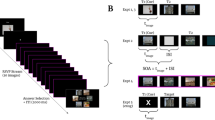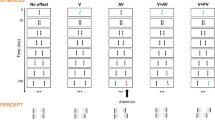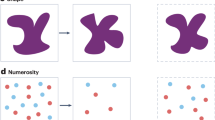Abstract
Two visuospatial phenomena, serial search and inhibition of return, have recently gained the attention of scientists from such diverse disciplines as neuroscience, artificial intelligence and cognitive psychology1–5. A linear increase in search latency with increasing display size has been assumed to reflect serial focused attention to each item in the display. A delay in the detection of a signal in a previously attended location has been assumed to reflect an inhibitory process that may be used to prevent attention from returning to the same stimulus. The following study of human performance supports these assumptions and, by demonstrating that inhibition of return operates in serial search, presumably to improve search efficiency, provides a functional link between these two phenomena.
This is a preview of subscription content, access via your institution
Access options
Subscribe to this journal
Receive 51 print issues and online access
$199.00 per year
only $3.90 per issue
Buy this article
- Purchase on Springer Link
- Instant access to full article PDF
Prices may be subject to local taxes which are calculated during checkout
Similar content being viewed by others
References
Posner, M. I. & Cohen, Y. in Attention & Performance X: Control of Language Processes (eds Bouma, H. & Bouwhuis, D.) 531–556 (Lawrence Erlbaum, Hillsdale, 1984).
Posner, M. I., Rafal, R. D., Choate, L. S. & Vaughan, J. Cognitive Neuropsychol. 2, 211–228 (1985).
Koch, C. & Ullman, S. Hum. Neurobiol. 4, 219–227 (1985).
Treisman, A. Scient. Am. 255, 106–115 (1986).
Crick, F. Proc. natn. Acad. Sci. U.S.A. 81, 4586–4590 (1984).
Posner, M. I. Q. J. exp. Psychol. 32, 3–25 (1980).
Briand, K. & Klein, R. M. J. exp. Psychol., hum. Percept. Perform. 13, 224–228 (1987).
Eriksen, W. & Hoffman, J. E. Percept. & Psychophys. 11, 169 (1972).
Jonides, J. in Attention & Performance IX (eds Long, J. & Baddeley, A.) 187–204 (Lawrence Erlbaum, Hillsdale, 1981).
Sagi, D. & Julesz, B. Nature 321, 693–695 (1986).
Maylor, E. A. & Hockey, R. J. exp. Psychol., hum. Percept. Perform. 11, 777–787 (1985).
Maylor, E. A. in Attention & Performance XI (eds Posner, M. I. & Marin, O.) 189–207 (Lawrence Erlbaum, Hillsdale, 1985).
Treisman, A. & Gelade, G. Cognitive Psychol. 12, 97–136 (1980).
Treisman, A. & Souther, J. J. exp. Psychol., hum. Percept. Perform. 12, 3–17 (1986).
Broadbent, D. in Modelling Cognition (ed. Morris, P. E.) (Wiley, London, in the press).
O'Keefe, K. & Nadel, L. The Hippocampus as a Cognitive Map (Oxford University Press, Oxford, 1978).
Olton, D. S., Handelman, G. E. & Walker, J. A. in Foraging Behavior: Ecological, Ethological and Psychological Approaches (eds Kamil, A. C. & Sargent, T. D.) 333 (Garland, New York, 1981).
Author information
Authors and Affiliations
Rights and permissions
About this article
Cite this article
Klein, R. Inhibitory tagging system facilitates visual search. Nature 334, 430–431 (1988). https://doi.org/10.1038/334430a0
Received:
Accepted:
Published:
Issue Date:
DOI: https://doi.org/10.1038/334430a0
This article is cited by
-
Stimulus-driven updating of long-term context memories in visual search
Psychological Research (2022)
-
Nicotine promotes the utility of short-term memory during visual search in macaque monkeys
Psychopharmacology (2022)
-
Target familiarity and visual working memory do not influence familiarity effect in visual search
Scientific Reports (2021)
-
An Analysis of the Impact of Attentional Momentum Effect on Driver’s Ability of Awareness During Night-time Driving
International Journal of Intelligent Transportation Systems Research (2021)
-
Behavioral and neuronal study of inhibition of return in barn owls
Scientific Reports (2020)
Comments
By submitting a comment you agree to abide by our Terms and Community Guidelines. If you find something abusive or that does not comply with our terms or guidelines please flag it as inappropriate.



